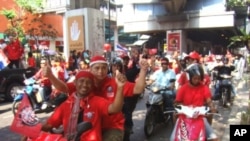Anti-government demonstrators in Bangkok took to the streets in a massive convoy to press their case for the government of Prime Minister Abhisit Vejjajiva to resign and call fresh elections. Many local residents supported the protest adding pressure on the six party coalition government.
Click to Listen:
Thousands of people joined the protest convoy Saturday on motorbikes, vans and trucks that stretched up to eight kilometers along Bangkok's usually busy thoroughfares.
Bangkok residents had been warned to remain at home to avoid being caught up in the traffic congestion.
The convoy came after a week of protests by the demonstrators, known for wearing red, who have targeted the 15-month-old government of Prime Minister Abhisit Vejjajiva, calling on him to dissolve the parliament and call elections.
Other protests during the week have included the pouring of blood on key goverment administrative buildings in ritual ceremonies.
The so-called Red Shirts, led by the United Democratic Front against Dictatorship, or UDD, have the backing of the main parliamentary opposition group, the Puea Thai Party.
Protestors, such as this man, pressed the government to resign.
He said the protestors want to see a new election was the only thing that mattered to the protestors.
The UDD and Puea Thai Party are supporting former Prime Minister Thaksin Shinawatra, who was ousted in a coup in 2006. They claim Mr. Abhisit's coalition government is illegitimate as it came to power after courts removed two pro-Thaksin Governments since 2007 elections.
At the rally site during the week, protest leaders and Mr. Thaksin in phone-in comments, said they were looking to challenge the existing bureaucratic elite.
But Mr. Abhisit, in recent media comments, says he will not be pressed to take the country to elections at present but is willing to hold talks with protest leaders. Representatives from both sides are due to meet Sunday.
Mr. Thaksin, who remains in exile in the face of a two year jail sentence for corruption, maintains support from the northern rural areas as well as among the poor and low income groups due to populist economic policies while in office.
But the urban middle class accused Mr. Thaksin of corruption and abuse of power while he was in office, especially by his government's attacks on the media and his perceived efforts to control most levers of power including the parliament, independent government agencies and security forces.
This office manager, overlooking the protests, says many people in Bangkok still do not trust Thaksin. "I don't like this - Red People; because I don't like Thaksin. Most Bangkok people they think Thaksin is very selfish. He thinks about his family only, about his business only," he said.
Other bystanders say they remain fearful if Thailand was pressed to elections and pro-Thaksin parties won it may do little to end the cycle of political tensions that have engulfed the country since late 2005.
So far the protests have been largely peaceful, in contrast to anti-government demonstrations in April last year when the government was forced to enact security laws with the military brought in to end the unrest.











